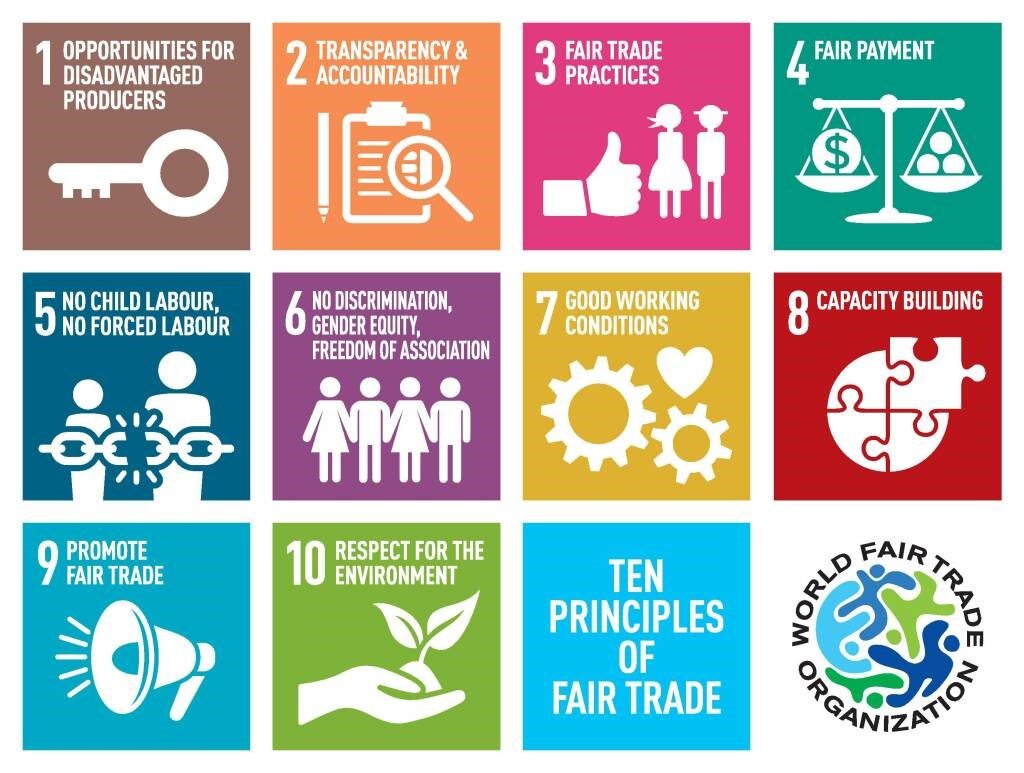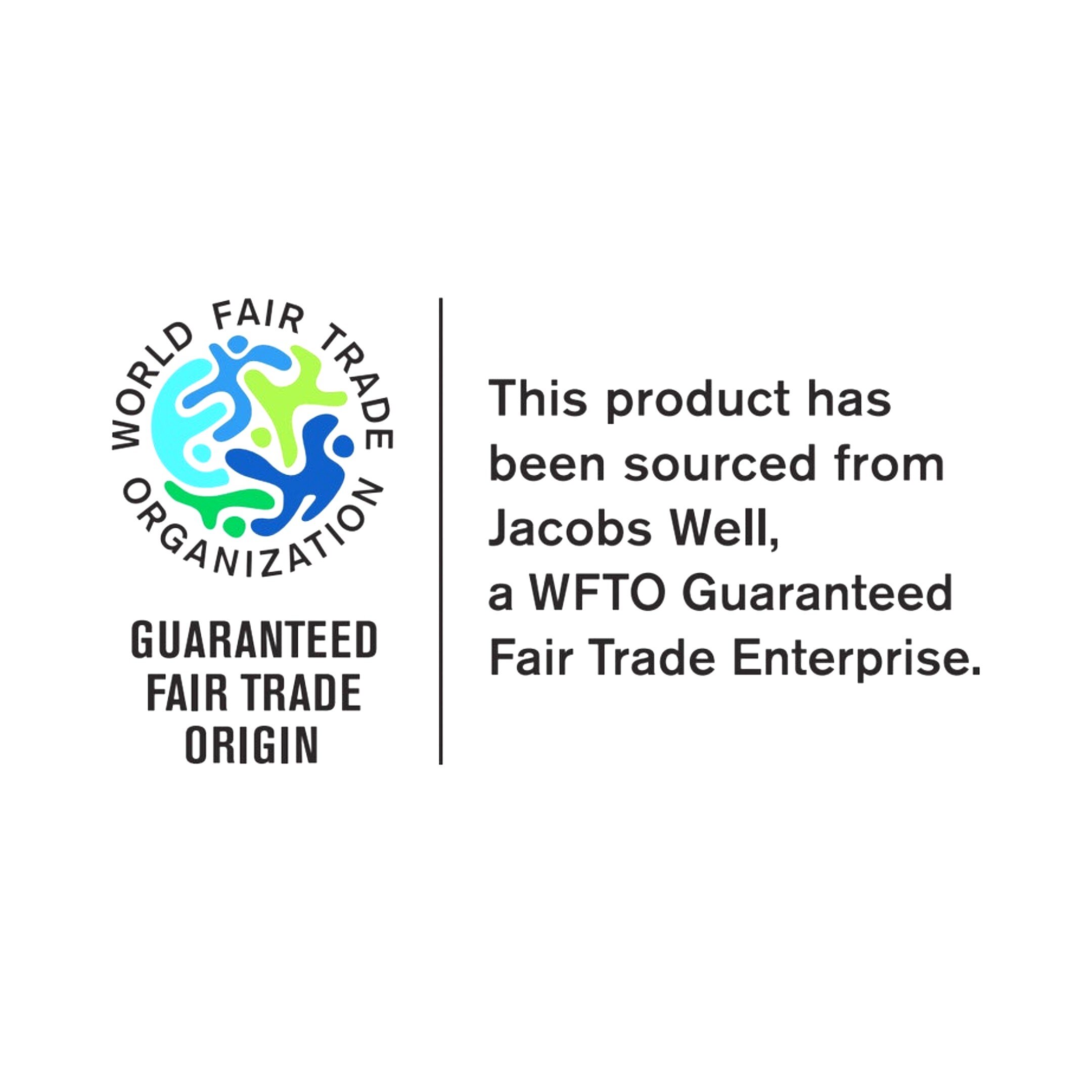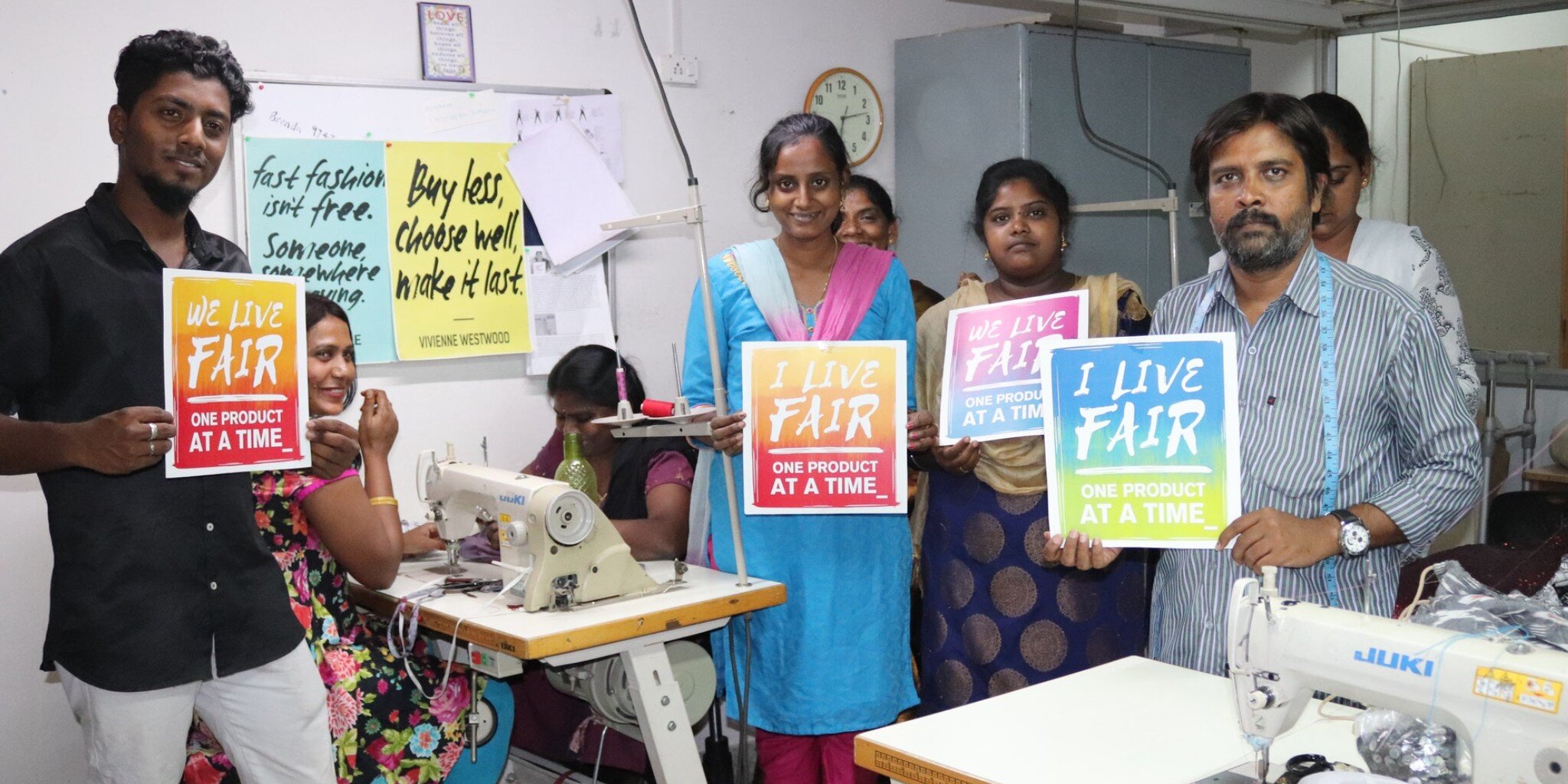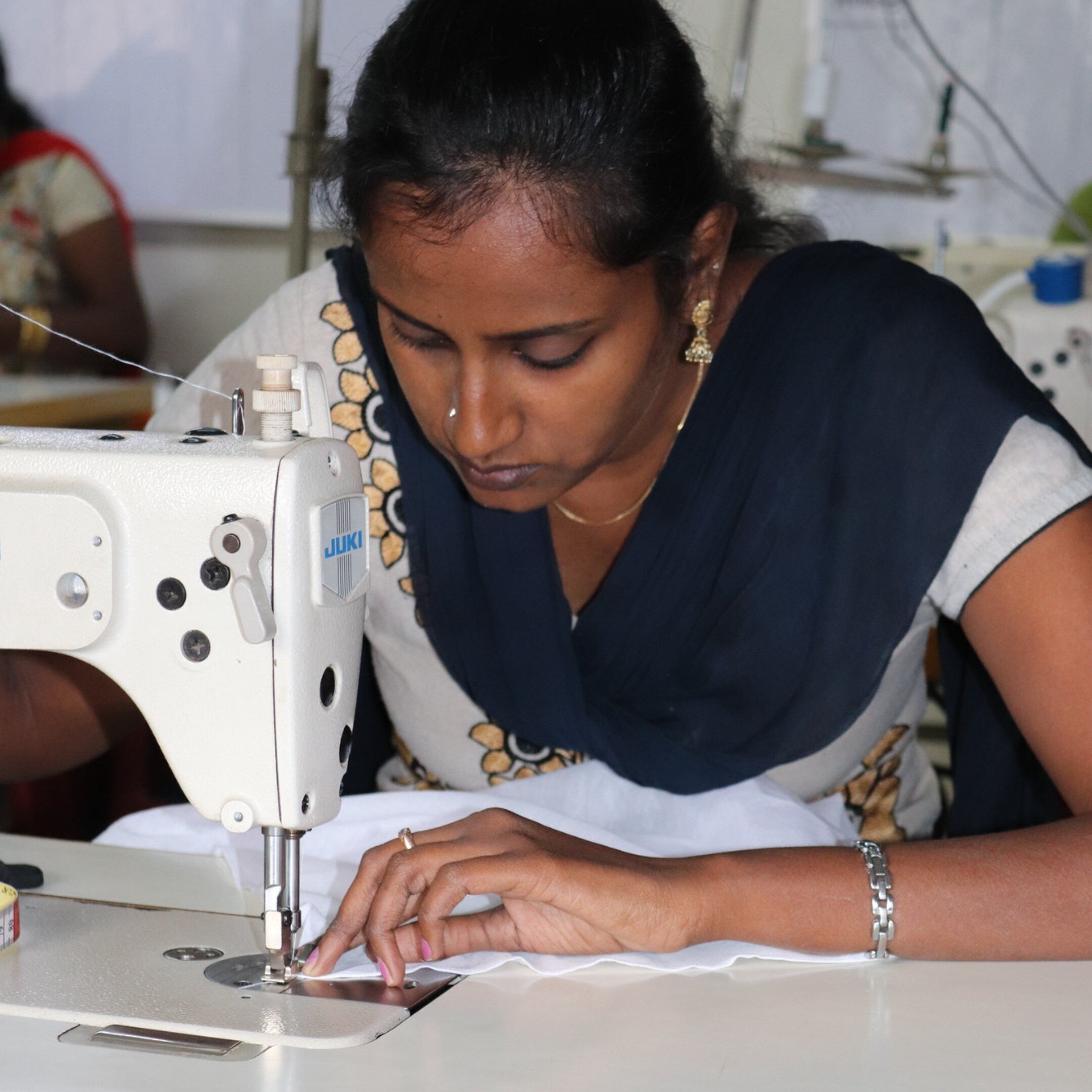What is Fair Trade fashion and why is it important?
Do you know what Fair Trade means and how it affects fashion?
As we celebrate Fair Trade Fortnight 2021, I thought it would be a good to share with you why at Jenerous we believe in Fair Trade production.
This year Fair Trade Fortnight’s slogan is “Choose the world you want.” Our choices as individuals and businesses make a difference and impact people and the planet.
What is Fair Trade?
Fair Trade is more than just trading, according to World Fair Trade Organisation:
It is a vision of business and trade that put people and planet before profit
It fights poverty, climate change, gender inequality and injustice
Is a proof of concept that showcases the enterprise models of the new economy
The WFTO has 10 principles of Fair Trade that ensure that people and the planet are put first. You can read more detail about these 10 principles on the WFTO website.
The 10 principles of Fair Trade
Principle One: Creating Opportunities for Economically Disadvantaged Producers
Poverty reduction through trade and making producers economically independent.
Principle Two: Transparency and Accountability
Involving producers in important decision making and being transparent and accountable in management and commercial relations.
Principle Three: Fair Trading Practices
Trading fairly with concern for the social, economic and environmental well-being of producers.
Principle Four: Fair Payment
Paying producers a fair and fixed price by mutual agreement, ensuring socially acceptable wages depending on the location. The aim is always the payment of at least a Local Living Wage.
Principle Five: Ensuring no Child Labour and Forced Labour
Adhering to the United Nations (UN) Convention on children’s rights. The organisation ensures that there is no forced labour in its workforce and / or members or homeworkers.
Principle Six: Commitment to Non Discrimination, Gender Equity and Women’s Economic Empowerment, and Freedom of Association
Respecting the trade union rights and rejecting discrimination based on gender, religion or ethnicity.
Principle Seven: Ensuring Good Working Conditions
Providing a safe and healthy working environment for producers and workers in line with the International Labour Organization (ILO) conventions.
Principle Eight: Providing Capacity Building
Seeking to develop the skills of producers and workers so they can continue to grow and prosper.
Principle Nine: Promoting Fair Trade
Raising awareness for the need of greater justice in world trade by trading fairly with poor communities.
Principle Ten: Respect for the Environment
Caring for the environment by maximising use of sustainable energy and raw materials while minimising waste and pollution.
(Source: WFTO)
How does Fair Trade affect fashion?
Fair pay
Sadly, the majority of clothing is made by factories where staff are under paid. 93% of fashion brands surveyed by Fashion Checker aren’t paying garment workers a living wage. Many clothing factories are in developing countries such as India and Bangladesh, where garment workers are often unable to afford life's basic necessities.
We agree with Fashion Checker, that "Fair pay for labour is a fundamental human right" and are shocked by the fact that "none of the biggest fashion brands pay garment workers a wage they can live on." (Fashion Checker)
A living wage, is a wage that is sufficient to afford a decent standard of living for a worker and their family. It should be earned in a standard work-week of no more than 48 hours, and must include enough to pay for food, water, housing, education, health care, transportation, clothing and some discretionary earnings, including savings for unexpected events.
Fairtrade ensures living wages are paid to the producers, which means that they can afford their basic needs.
Fair and safe working conditions
Often garment factories are failing to provide safe environments with adequate lighting and fire escapes etc. On 24 April 2013, the collapse of the Rana Plaza building in Dhaka, Bangladesh, which housed five garment factories, killed at least 1,132 people and injured more than 2,500. This disaster bought to light the issue of unsafe working conditions. Fair Trade factories ensure that work environments are safe.
Workers in the garment industry also face long hours without breaks, discrimination and abuse, and often receive no benefits such as holidays, sick pay etc. Fair Trade organisations provide work that is fair and supports equal opportunities for women who make up 80% of the garment workforce. (Fashion Checker)
No child or forced labour
The global fashion industry remains one of the biggest drivers of modern slavery, with more than one hundred billion pounds worth of garments at-risk of modern slavery imported into G20 countries in 2017 (Walk Free Foundation). You can read more about forced labour and explotation within the fashion industry in this Fashion Revolution article.
Recent news reports that China is forcing hundreds of thousands of Uighurs and other minorities into hard, manual labour in the vast cotton fields of its western region of Xinjiang, and textile factories. You can read more in this BBC article.
Fair Trade standards ensure tat people are choosing to work rather than being forced to work.
Care for the environment
The fashion industry is the second most polluting industry in the world. A recent article in the National Geographic article explains more about the environmental impact of fashion’s greenhouse gas emissions, excessive water usage, plastic microfibre dumped into the oceans, pesticides used in cotton farming, the toxic dyes that pollute waterways, not to mention the lorry-load of used clothing that is incinerated or buried in landfill every single second.
Fair Trade encourages sustainable production, waste and pollution reduction and prioritising the planet as well as people.
Jenerous’ Fair Trade clothing
At Jenerous we have a real concern for the social and economic wellbeing of the people that make our clothing. Fair Trade production and prioritising people and the planet is integral to the Jenerous brand ethos, as we seek to make a positive difference and change lives through fashion.
We're partnering with Fair Trade factories in India that make our clothing. By doing so our customers have the assurance that the people making our clothing are paid fairly and have safe and fair working conditions.
Fair work should be the norm in fashion supply chains but sadly it isn’t, and at Jenerous we want to join with other amazing Fair Trade brands and lead the way in creating better fashion.
We are so excited to share with you that we are now registered as a WFTO First Buyer, that partners with Jacobs Well a Fair Trade factory in Bangalore, India. This means that we can use the WFTO First Buyer Label on the products in our collection that have been made by Jacobs Well.
The WFTO describes a first buyer as: “A First Buyer is a business that buys products from a Guaranteed Fair Trade Enterprise and who wants to re-brand these without being verified under the Guarantee System. Upon a positive assessment by WFTO and the Guaranteed Fair Trade Enterprise, WFTO will provide a First Buyer Label.”
A WFTO Supplier - Jacobswell
In recent developments (August 2024), Jacobswell have decided not to renew their WFTO membership due to the financial implications, and are therefore no longer a registered WFTO member. However, the products on our website were all made whilst they were a member. Their business structure and commitment to empowering and safe work, continue to be unchanged, and this decision reflects the challenges facing small businesses across the globe.
Being a WFTO member means that not only is Jacobswell adhering to Fair trade principles they are also a social enterprise. Jacobs well is transforming the lives of India’s urban poor through sustainable employment and personal development. They train and employ vulnerable young people from low socio-economic backgrounds who often have few employment or training opportunities.
Many of the employees have worked at the factory for a long time due to the positive environment and the good working conditions. As a Fair trade factory there is no child or forced labour and the workers have a safe and clean place to work, as well as a sustainable income that is above the minimum wage. The workers also receive benefits such as; medical insurance for themselves and their families, a pension equivalent, holiday and sick leave, breaks in the day, and are paid for optional over-time.
How can you support Fair Trade and make a difference?
We might not always think about the people who make our clothing and whether they have been treated and paid fairly. If we did, I think we would feel compelled to purchase differently. We can all be part of positive change and a better world, if we choose to purchase Fair Trade products. You can find out more about Fair Trade clothing here and you can discover other Fair Trade clothing brands on the Fairtrade website.




